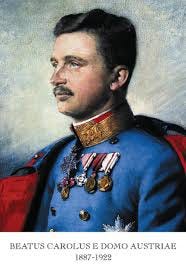The New Digest is thrilled to present a guest essay by His Excellency Archduke Eduard Habsburg-Lothringen, Ambassador of Hungary to the Holy See.
It never ceases to amaze me why the Americans, of all people, are absolutely smitten with the Habsburgs. This is a nation built on the smoking ruins of monarchies, that is: the fight against crowns and tyrants is more or less built into its matrix. This is the cradle of modern democracy, after all. There is also no monarchy to look back to that might explain the nostalgic look back onto this family that ruled large parts of Europe (and the world) for the better part of 750 years. But still, whenever I post Habsburg-related media, articles, pictures on Twitter (that no-one will ever force me to call X) I feel overwhelming benevolence from the American public. Most of my (admittedly) mostly conservative US followers see the Habsburgs as “wholesome” and “something great.”
That is, of course, if they are not Antifa trolls. Those spend their time brilliantly posting images of decrepit-looking ancestors of mine from the Spanish family branch, with enormous jutting Habsburg jaws and other signs of genetic degeneracy. Oh, the laughter and the brilliance.
But why so much love for the Habsburgs? I believe I have found an answer to that question. Last year I did a “Habsburg World Championship” on Twitter where you could vote for your favorite Habsburg. This went on for weeks, with every round eliminating famous Habsburgs from the centuries, until the winner finally was chosen: Blessed Emperor Karl, that soft-spoken, friendly giant of faith, who ruled for a puny 18 months towards the end of the First World War. And who managed to lose the war, the Empire and die miserably a few years later in exile.
Why does he find so much love among Americans? Well, some will point to the fact he has been beatified by Saint Pope John Paul II. But I believe it’s something else. You see, I think Americans are in a crisis when it comes to their political leaders. And the Habsburgs seem to fulfil a lot of the things Americans really would like to believe in their leaders – but don’t find any more. I believe Americans are, deep inside, pioneer spirits. They want to believe in a man’s word, in the shaking of a hand. They want to believe that a yes is a yes, a no a no and that the only thing that drives their political leading class is the nation’s best interest.
But over the last few years, perhaps after the difficult time of a certain virus, this confidence in America’s leaders has been deeply shaken. People have noticed that, perhaps, other interests are taking precedence. Stories of corruption are becoming more frequent, and many feel that they cannot trust their political leaders as much as before. Also, and this must be said, many of these leaders have a run in politics, and later find a plum job somewhere in business and finance. They will never have to bear the consequences of their politics.
By contrast, it must also be said, a monarch has to live with the decision he makes for all his life, and possibly his son or daughter will have to bear the consequences later. Which gives a monarch a wider, more long term view of things. And here you have a family, the Habsburgs, that seems, at least over large stretches, to have had their subject’s interests at heart. Perhaps fueled by a deep and humble Catholic faith. A faith deeply aware that one day God may ask accountability of them for how they used – or misused – their power. The Habsburgs had rulers that, of necessity, had to respect subsidiarity. They felt that they were the advocates of their peoples – an attitude never better captured than in that in the famous quote by old Emperor Franz Joseph, made when President Roosevelt asked him what exactly his job was, now that Austria had parties, a Parliament, ministers, and a Prime Minister? “My job is to protect my peoples from their politicians,” Franz Joseph is supposed to have said.
And this leads us to Blessed Karl. A family man who led a beautiful marriage and loved his wife and children dearly. Who wore his heart – and his faith – on his sleeve, in an almost vulnerable way. Who saw the coronation as a deep, terrible, sacral duty put upon him by God. Who let Catholic social teaching deeply influence his social politics. Who strove for peace in the middle of a war, because the Pope encouraged him to do so.
And, most of all, who offered his life to God for his peoples, when these had sent him into exile. He did this as a conscious act. Later, when he got ill and lay dying, over long days, he offered his terrible suffering for his peoples.
Now, pause a little second, and try to imagine one of our political leaders offering up their personal suffering to God for their people.
No, I can very well understand why for many Americans the Habsburgs, symbolized by Blessed Karl, can conjure a feeling of longing in today’s world. Perhaps they can serve as an example for our leading class, our politicians. Grab a book on the Habsburgs – if you want a breezy read take my own THE HABSBURG WAY – and read up on the virtues (and weaknesses) of that family.
And let them inspire and elevate your work as a politician.





The terrible irony is that the accursed President Wilson was one of the men most responsible for the destruction of the Habsburg possessions (which was why Sigmund Freud always loathed him).
Well now I'm going to share this with all of my American friends.